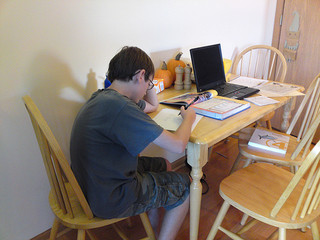Health
Childhood ADD: How To Help Your Child Get Organized

Most children occasionally get a little hyper and have trouble focusing, but a continued lack of the ability to pay attention may be an indicator of attention deficit disorder (ADD), a serious learning disability that affects up to 7.5 percent of children in the United States. If your child has been recently diagnosed, you are probably feeling a bit overwhelmed. You want to help your child, but you aren’t sure where to begin.

1. Communicate Honestly
It’s important to explain your child’s diagnosis in a way that is appropriate for his or her age. Some parents attempt to hide the disorder by acting like nothing is wrong, but doing this can create a subconscious feeling of worry in the child’s mind. A child can feel when something is being avoided, and that feeling can trigger anxiety if the realities of the situation are never properly explained. Honesty is always the best policy when dealing with ADD or any other illness.
2. Look for Outside Help
If you’re struggling to organize your life and help your ADD child, consider looking for outside help. Websites such as www.noomii.com provide access to a number of qualified professional life coaches in nearly any geographical location. If you choose a life coach who has experience with ADD and other learning disabilities, they can help you plan and organize your everyday affairs and help your child find success.
3. Don’t Allow for Excuses
If your child is old enough to understand the nature of the disorder, they may feel compelled to use it as an excuse. The frustrating affects of the disorder can be easy to blame for any number of unrelated problems. Always remind your child that even though the ADD makes things harder, he is just as capable of accomplishing things as anyone else. Adopt a “no excuses” policy and help inspire hard work.
4. Create Structure and Discipline
All children need a structured environment to help them grow and thrive, and this is especially true for children with ADD. When a person feels mentally scattered, it can help to have expectations presented in a clear way. Help your child improve by writing down a list of goals at the beginning of each week and posting them in her bedroom.
5. Support Talents and Strengths
ADD children are often incredibly intelligent, and many of them possess a number of special talents. Help your child discover their purpose by supporting any talents or interests that you see forming. Children with learning disabilities often feel bad about themselves, and seeing their own talent can do a lot to reverse that.
Being the parent of a child with ADD isn’t easy. You want the world for your child, and it can hurt to see that he is going to have to work a little harder than everyone else to find success. However, with your help and the help of a qualified professional, you can soon see a version of your child that you never expected, and they just might make you proud.
Featured images:
License: Creative Commons
image source
- License: Image author owned
By Lisa Coleman
As a mother of child who has been diagnosed with ADD, Lisa Coleman understands the daily frustration and feeling of being overwhelmed that can accompany a parent. She writes to educate others who might be faced with these challenges and relates how support from a life coach, found easily online at www.noomii.com, was able to help her establish balance and goal setting within her own home.
-

 Tech11 years ago
Tech11 years agoCreating An e-Commerce Website
-

 Tech11 years ago
Tech11 years agoDesign Template Guidelines For Mobile Apps
-

 Business6 years ago
Business6 years agoWhat Is AdsSupply? A Comprehensive Review
-

 Business10 years ago
Business10 years agoThe Key Types Of Brochure Printing Services
-

 Tech8 years ago
Tech8 years agoWhen To Send Your Bulk Messages?
-

 Tech5 years ago
Tech5 years ago5 Link Building Strategies You Can Apply For Local SEO
-

 Law5 years ago
Law5 years agoHow Can A Divorce Lawyer Help You Get Through Divorce?
-

 Home Improvement6 years ago
Home Improvement6 years agoHоw tо Kеер Antѕ Out оf Yоur Kitсhеn































